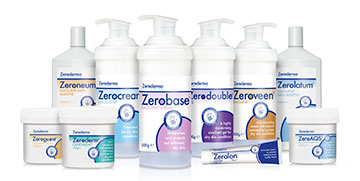Healthcare staff, COVID precautions and dry skin

If you are a front line health worker, you’ve probably been wearing a face mask and practising hand hygiene a lot more frequently than usual. Unsurprisingly, this is leading to reports of increasing occupational dermatitis, particularly on the hands and face of healthcare staff.
A recent audit conducted by the British Society of Cutaneous Allergy (BSCA) found that 59% of healthcare workers seen in occupational skin disease clinics (set up during the COVID-19 pandemic) were found to be affected by irritant contact dermatitis. The audit also noted that on average, healthcare workers washed their hands with soap 22.8 times a day and used alcohol based hand rub 22.7 times per day. 18% of healthcare workers required time off work as a result of occupational skin problems.1,2
In Hubei Province, China, 97% of COVID-19 front-line doctors and nurses were reported to have developed skin problems on the face and/or the hands. These were related to preventive measures including personal protective equipment (PPE) like masks, goggles, face shields and double-layer gloves, as well as frequent handwashing and the use of alcohol based hand gel. The most frequent symptoms were dryness, tightness, and itching or pain in the affected areas.1,2
Hand dermatitis is not just attributable to frequent hand cleansing but also to the use of PPE. Wearing gloves for extended periods of time leads to sweating that may exacerbate or cause irritant contact dermatitis.3
For anyone at risk of irritant contact dermatitis or other adverse reactions to hand hygiene products and frequent use of PPE, additional skin moisturising is needed.
‘The use of precautionary measures, including emollients, barrier creams, and moisturisers, is essential in preventing skin complications aggravated by preventive steps taken during the pandemic.’ 4
Emollients help reduce the clinical signs of dryness, such as roughness or scaling, and improve symptoms, like itching and tightness. Several controlled trials have shown that regular use of such emollients can help prevent and treat irritant contact dermatitis caused by hand hygiene products. In a survey of nurses, the use of an appropriate emollient was associated with a 50% reduction in dermatitis.5
Frequent hand hygiene procedures and the wearing of face coverings are currently part of everyday life; whilst focussing care on patients, health professionals shouldn’t forget to look after their own skin.
General skin care advice
- Always use a fragrance-free emollient after washing your hands or using a hand gel.
- Use a fragrance-free emollient on your face after wearing a face covering
- Apply the emollient with smooth downwards strokes, but don’t rub it in.
- Avoid wearing make-up under your mask, as it may block skin pores.
- If your lips become dry, wear a fragrance–free lip salve or an emollient ointment.
Note
References
- Narang I. et al, Occupational dermatoses during the COVID-19 pandemic: a multicentre audit in the U.K. and Ireland, research presented at the Virtual Annual Meeting of the British Association of Dermatologists (September 2020).
- British Society Cutaneous Allergy and British Association of Dermatologists, Update On Occupational Skin Disease During The Coronavirus Pandemic, updated 20th April, 2020
- Al Badri FM, Surgical mask contact dermatitis and epidemiology of contact dermatitis in healthcare workers; Current Allergy & Clinical Immunology 2017, Vol 30, No 3
- Darlenski R. et al, COVID-19 pandemic and the skin: what should dermatologists know? https://doi.org/10.1016/j.clindermatol.2020.03.012
- World Health Organisation, WHO guidelines on hand hygiene in health care, 2009
